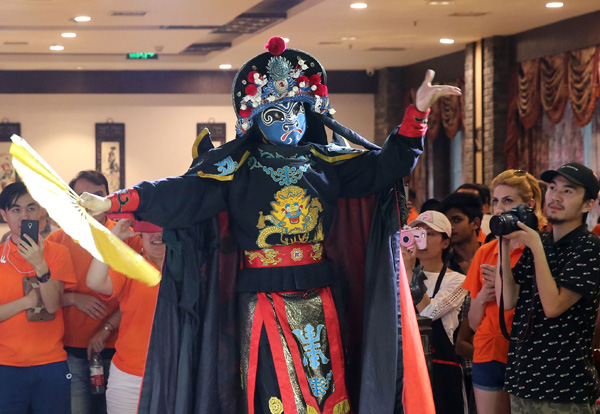News
Overseas students get a taste of Chongqing
Updated: 2016-08-29By TAN YINGZI/DENG RUI ( China Daily )
A folk artist performs a traditional face-changing stunt for foreign students at the Chongqing Hotpot Museum and Restaurant. [Photo by WANG ZHUANGFEI/CHINA DAILY]

Centerpiece of visit is hotpot, accompanied by traditional face-changing performance
"I love Chongqing hotpot," wrote Japanese student Seita Nukada in beautiful Chinese calligraphy to express his passion for the local cuisine.
The 21-year-old, an exchange student at Southwest University, has eaten at over 30 hotpot restaurants in this southwest metropolis in the past nine months, and he said he is "addicted" to the burning feeling of Sichuan pepper.
He presented the calligraphy scroll as a gift to Yan Qi, the co-founder of Chongqing Hotpot Museum and Restaurant on June 17 after Yan gave a speech on local food history to overseas visitors.
Organized by the China Scholarship Council, 85 students from 40 countries who are studying in Chongqing participated in the summer program "Feeling the energy of China". Southwest University was the host this year.
One of the highlights was learning about the city's most popular food: hotpot.
Boasting both the best and largest number of hotpot restaurants in the country, Chongqing was named "China's hotpot city" by the China Cuisine Association in 2007.
Traditional Chongqing hotpot uses beef tallow and large quantities of chili and Sichuan peppers. Ox stomach and duck intestine are the must-have dishes on locals' hotpot tables.
"Hotpot is our city's signature cuisine with a long history," Yan said.
While acknowledging that "it's not too healthy", given hotpot's excessive oil and spices, "I am a huge fan of hotpot," Nukada said. "Pig brain is my favorite dish."
The students learned the history of hotpot at the museum and watched the chef making the soup. Some even cooked it themselves.
"When I first ate hotpot in Chongqing, I almost fainted because it's so spicy," said Khishigdelger from Mongolia, an undergraduate at Southwest University majoring in international trade.
"But now I have fallen in love with it."
During World War II, when Chongqing was the wartime capital, the dish gained global popularity.
Now from New York to Dubai, chain restaurants serving Chongqing hotpot are all over the world.
Last year, the city exported 400 metric tons of packed hotpot soup base to 10 countries and regions, including the United States, Australia and Southeast Asia.
Face-changing fan
It was a lucky day for Ali Hassan. The Egyptian got the opportunity to perform with a local facing-changing master at the Chongqing Hotpot Museum and Restaurant.
"Finally, Master Wang agreed to give me some guidance in the future," he said.
Face-changing is a closely-kept secret movement in Sichuan Opera where a character, by quick manipulation of a mask, literally changes the face they show to the audience in a split-second.
It is the most eye-catching artistic technique that shapes a character's personality in the opera-an exquisite theatrical form that dates back 300 years.
According to tradition, the skill can only be passed to males within the family. Therefore, a foreigner such as Hassan would not be able to find a teacher in China.
"I failed to find someone to teach me. I have learned the techniques by watching the videos," he said.
Hassan, 24, studied linguistics at Southwest University since 2013 and he is about to graduate this summer. When he was a child, he watched a movie about face-changing and decided to learn it.
"It was my dream to learn the skill and I realized it in Chongqing," he said.
Hassan will leave Chongqing this summer to continue his studies in New York.
"I will keep polishing my facing-changing techniques and introduce this ancient Chinese art to more people," he said.


